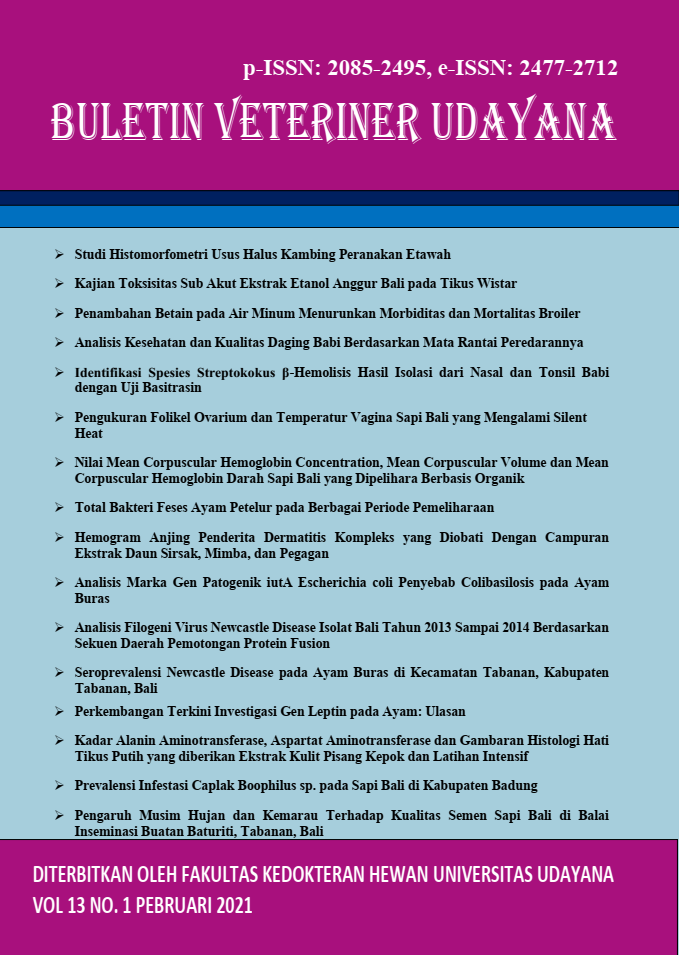STUDY OF SUB ACUTE TOXICITY OF BALI GRAPES ETHANOL EXTRACT IN WISTAR RATS
Abstract
Bali grapes are a source of antioxidants with high flavonoids and anthocyanins, which have many health benefits such as lowering cholesterol and anti-cancer, inhibiting aging, and protecting the heart. Many people consume Balinese grapes by eating directly, drink in the form of juice or extract form because of its benefits. The purpose of this study was to determine the sub-acute toxicity of the ethanol extract of bali grapes (Vitis vinera cv. Alphonso lavelle) to changes in SGOT and SGPT of male Wistar rat liver. This test includes a sub-acute toxicity test and a pharmacological effect test. This research is an experimental study with a completely randomized design using a post-test-only control group design. The number of white rats used in this study were 24 rats, which were divided into four groups of control groups, groups of mice given ethanol extract of bali grapes 0.3 g / ml/kg BW (P1), groups of mice given ethanol extract of grapes bali 3 g / ml/kg BW (P2), and the group of rats that were given 30 g / ml kg BW (P3) of ethanol extract of bali grapes. Each group consisted of 6 white male rats. In this study, the grape ethanol extract was presented orally once per day for 28 days. After 28 days of treatment, Wistar rats were euthanized, and blood samples were taken through Chantus Medial Orbitalis and then put into non-EDTA tubes. The blood sample that has been centrifuged and becomes serum is then inserted into the Eppendorf tube, which is used to test the levels of SGOT and SGPT. The results of the One-Way ANOVA analysis on SGPT levels in the liver of rats showed a significant difference (P <0.05), so that further analysis was necessary using the Duncan-test. Based on the results of the analysis using the Duncan Test, changes occurred in the P3 treatment group of rats given the ethanol extract of Bali grapes at a dose of 30 g / ml/kg BW, which was significantly different from the control treatment group (P0) so that the mixture of these materials was included in the class of materials that were practically non-toxic.
Downloads
References
Azam EI, Little JB. 2004. Human and Experimental Toxicology. An Internasional Journal. 2004: 61–65.
Brzoska MM, Jakoniuk JM, Marcinkiewicz BP, Sawicki B. 2003. Liver and Kidney Function and Histology in Rats Exposed to Cadmium and Etanol. Alcohol and Alcoholism. 38(1): 2-10.
Cao G, Mumlitelli HU, Moreno CS, Prior RL. 2001. Anthocyanins are Absorbed in Glycated Forms in Elderly Women. American J. Clin. Nutr. 73(5): 920-926.
Donatus AI. 2001. Toksikologi Dasar. Fakultas Biofarmasi-Universitas Gajah Mada. Yogyakarta.
Gallagher ME. 2003. Toxicity Testing Requirement, Methods and Proposed Alternatives. Environs. 26(2): 253-273
Hariyatmi, 2004, Kemampuan Vitamin E Sebagai Antioksidan Terhadap Radikal Bebas Pada Lanjut Usia, J. MIPA. 14(1): 52-60.
Mutia D. 2010. Uji Toksisitas Akut Ekstrak Etanol Buah Anggur (Vitis vinera) terhadap larva Artemia salina Leach dengan Metode Brine Shrimp Lethality Test (BST). Skripsi: Fakultas Kedokteran. Universitas Diponegoro.
Shi J, Yu J, Pohorly JE, Kakuda Y. 2003. Polyphenolics in grape seeds-biochemistry and functionality. J. Med. Food. 6: 291-299.
Siswanto FM, Suryawan IW , Wirawan TH, Rochman F, Pangkahila JA. 2014. Ekstrak Buah Anggur Menurunkan Kadar Aspartate Transaminase Darah Mencit dengan Aktivitas Fisik Berlebih. Indonesia Medicus Veterinus. 3(3): 192-199.
Suryani N, Tinny EH , Aulanni'am. 2013. Pengaruh Ekstrak Metanol Biji Mahoni terhadap Peningkatan Kadar Insulin, Penurunan Ekspresi TNF-α dan Perbaikan Jaringan Pankreas Tikus Diabetes. J. Kedokteran Brawijaya. 27(3): 137-145.
Tarmizi. 2010. Buah Anggur Berpotensi Anti Kanker. Available from: http://kimia.unp.ac.id/?p=221. Accessed March 8, 2014.
Wiryanta BTW. 2008. Menumbuhkan Anggur di dalam Pot. Cetakan ke-7. Jakarta: PT Agromedia Pustaka. Pp. 7-12.
Yanjun Z, Dana K, Robert D, Rypo L, David W. International Multidimentional Authenticity Specification (IMAS) Algorithm for Detection of Comercial Pomegranate Juice Adulteration. J. Agric Food Chem. 57(6): 2550-2557.





